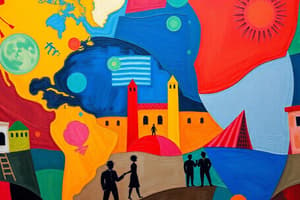Podcast
Questions and Answers
What does the methodology of comparative history primarily focus on?
What does the methodology of comparative history primarily focus on?
- Analyzing statistical data to identify trends
- Studying the impact of economic systems on societies
- Investigating the reliability of historical sources
- Examining similarities and differences across cultures or time periods (correct)
Which theme in history involves the study of wars, treaties, and peace processes?
Which theme in history involves the study of wars, treaties, and peace processes?
- Economic Systems
- Conflict and Resolution (correct)
- Cultural Exchange
- Power and Authority
Why is understanding history important for civic awareness?
Why is understanding history important for civic awareness?
- It provides context for current events and societal norms. (correct)
- It helps in predicting future economic trends.
- It encourages blind acceptance of governance.
- It solely focuses on the biographies of historical leaders.
What type of historical methodology evaluates sources for bias and perspective?
What type of historical methodology evaluates sources for bias and perspective?
Which of the following best describes the focus of quantitative history?
Which of the following best describes the focus of quantitative history?
What is the primary focus of political history?
What is the primary focus of political history?
Which source type provides original documents from the time period being studied?
Which source type provides original documents from the time period being studied?
During which historical period did the Renaissance occur?
During which historical period did the Renaissance occur?
What significant social structure characterized the Medieval Period?
What significant social structure characterized the Medieval Period?
Which of the following figures was crucial in the rise of the Roman Empire?
Which of the following figures was crucial in the rise of the Roman Empire?
What is the term for the study of historical writing and methodology?
What is the term for the study of historical writing and methodology?
Which of the following describes the timeframe of Modern History?
Which of the following describes the timeframe of Modern History?
What aspect of history does cultural history focus on?
What aspect of history does cultural history focus on?
Flashcards are hidden until you start studying
Study Notes
Overview of History
- Definition: The study of past events, particularly in human affairs.
- Branches of History:
- Political History: Focuses on political events and leaders.
- Social History: Examines societal structures and changes.
- Economic History: Studies economic systems and their evolution.
- Cultural History: Investigates cultural practices and artistic expressions.
Key Concepts
- Chronology: The arrangement of events in the order they occurred.
- Primary Sources: Original documents or evidence from the time period being studied (e.g., letters, photographs).
- Secondary Sources: Interpretations and analyses based on primary sources (e.g., history books, articles).
- Historiography: The study of historical writing and methodology.
Major Historical Periods
-
Prehistoric Era:
- Time before written records.
- Relies on archaeology and anthropology.
-
Ancient History (c. 3000 BCE - 500 CE):
- Development of writing, agriculture, and early civilizations (e.g., Mesopotamia, Egypt, Indus Valley, China).
-
Medieval Period (500 - 1500 CE):
- Feudalism, the rise of empires (e.g., Byzantine Empire, Islamic Caliphates).
- The influence of the Church and the Crusades.
-
Early Modern Period (1500 - 1800 CE):
- Renaissance, Reformation, and the Age of Exploration.
- Development of nation-states and colonialism.
-
Modern History (1800 - Present):
- Industrial Revolution, World Wars, Cold War.
- Globalization, technological advancements, and contemporary issues.
Important Historical Figures
- Alexander the Great: Conqueror who created one of the largest empires in ancient history.
- Julius Caesar: Roman general and statesman pivotal in the rise of the Roman Empire.
- Joan of Arc: Key figure in the Hundred Years' War, symbol of French nationalism.
- Mahatma Gandhi: Leader of the Indian independence movement through nonviolent resistance.
Methodologies in History
- Critical Analysis: Evaluating sources for bias, perspective, and reliability.
- Comparative History: Examining similarities and differences across cultures or time periods.
- Quantitative History: Using statistical methods to analyze historical data.
Themes in History
- Power and Authority: Examination of governance, revolutions, and the role of leadership.
- Conflict and Resolution: Wars, treaties, and peace processes.
- Cultural Exchange: Trade, migration, and the impact of globalization on societies.
- Economic Systems: Development of trade, capitalism, socialism, and their historical impacts.
Importance of Studying History
- Understanding the Present: Provides context for current events and societal norms.
- Learning from the Past: Offers lessons on human behavior, decision-making, and consequences.
- Civic Awareness: Informs citizens about their rights, responsibilities, and historical context of governance.
Overview of History
- Study of past events, specifically related to human activities and societies.
- Branches include:
- Political History: Focus on political events, leaders, and governance.
- Social History: Exploration of societal structures, norms, and changes over time.
- Economic History: Investigation of economic systems, their development and transformation.
- Cultural History: Examination of cultural practices and artistic expressions through time.
Key Concepts
- Chronology: Organization of events in the sequence they occurred.
- Primary Sources: Authentic documents or physical evidence from the specific period, such as letters and photographs.
- Secondary Sources: Analyses or interpretations based on primary sources, including history books and scholarly articles.
- Historiography: Examination of historical writing, methodologies, and perspectives in the study of history.
Major Historical Periods
- Prehistoric Era: Timeframe preceding written records; relies on discoveries in archaeology and anthropology.
- Ancient History (c. 3000 BCE - 500 CE): Characterized by the emergence of writing, agriculture, and early civilizations, like Mesopotamia and Egypt.
- Medieval Period (500 - 1500 CE): Defined by feudalism, the rise of empires (e.g., Byzantine Empire), and significant influence of the Church and Crusades.
- Early Modern Period (1500 - 1800 CE): Marked by the Renaissance, Reformation, Age of Exploration, and the establishment of nation-states and colonialism.
- Modern History (1800 - Present): Encompasses the Industrial Revolution, World Wars, Cold War, and advancements in globalization and technology.
Important Historical Figures
- Alexander the Great: Famed conqueror who built one of the largest empires in ancient history.
- Julius Caesar: Significant Roman general and statesman who played a crucial role in the rise of the Roman Empire.
- Joan of Arc: Notable figure in the Hundred Years' War and emblem of French nationalism.
- Mahatma Gandhi: Leader of India's movement for independence through methods of nonviolent resistance.
Methodologies in History
- Critical Analysis: Review of sources for biases, perspectives, and reliability to inform historical understanding.
- Comparative History: Study of similarities and differences in historical events across various cultures or eras.
- Quantitative History: Application of statistical methods for the analysis of historical data, uncovering trends and patterns.
Themes in History
- Power and Authority: Exploration of governance structures, revolutions, and leadership roles.
- Conflict and Resolution: Analysis of wars, treaties, and processes leading to peace.
- Cultural Exchange: Impact of trade, migration, and globalization on different societies.
- Economic Systems: Development and historical significance of trade, capitalism, and socialism.
Importance of Studying History
- Understanding the Present: Provides essential context for contemporary events and societal issues.
- Learning from the Past: Offers insights into human behavior, decision-making processes, and consequences of actions.
- Civic Awareness: Educates individuals about their rights and responsibilities, as well as the historical context of governance and laws.
Studying That Suits You
Use AI to generate personalized quizzes and flashcards to suit your learning preferences.




